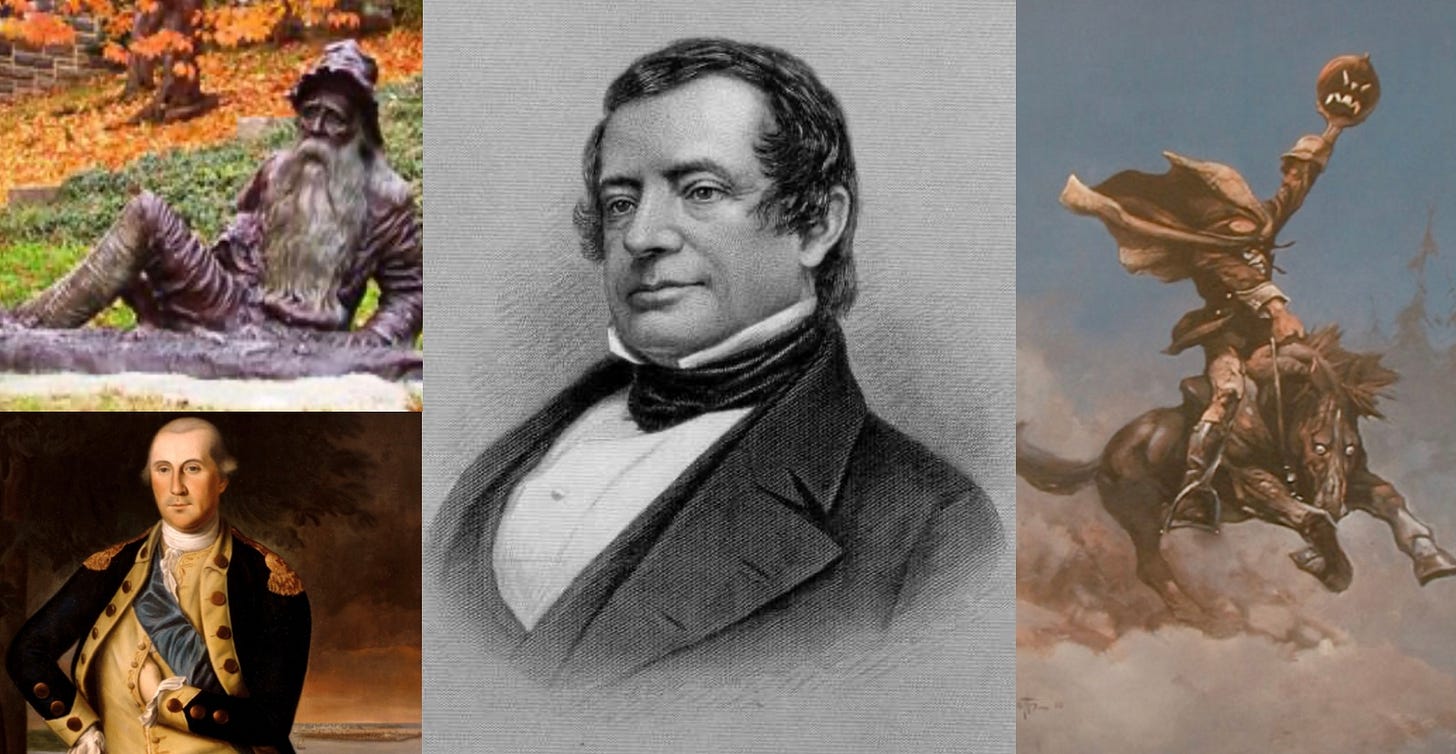A headless horseman, a Dutchman who slept for two decades, talking books, ancient castles, Revolutionary heroes, ghosts, schoolmasters, presidents, and playwrights all flowed from the pen of Washington Irving. Perhaps no American author has written folk tales with such wide and enduring appeal as the late, great Washington Irving, most famous today for his “Rip van Winkle” and “The Legend of Sleepy Hollow.”
Irving is one of my favorite authors, with his wit, his humor, and his ability to create unique and uniquely unforgettable images and characters. He wrote history and fantasy, satire and biography, and often blends a little of fact and fiction (for instance in his creation of the Headless Horseman, which was his own ghostly tale based off a Hessian who reportedly was beheaded by a cannon ball during a Revolutionary War New York battle). Irving wrote an acclaimed biography of the Father of Our Country, George Washington, though he is most remembered for his spooky folk stories.
But whether he was writing about George Washington or Shakespeare, whether he was satirically mocking his compatriots or extolling their virtues, whether his setting was English or American, whether he was writing ghost tales or travelogues or historical narratives, Irving was always thoroughly American: individualistic, innovative, witty, and inclined to laugh at any elitist with a swollen head.
Instead of writing a mini biography of Irving’s life on this anniversary of his death (Nov. 28, 1859), I would like to share just a few quotes from his writings which illustrate why his stories are still remembered to this day:
Villainy wears many masks; none so dangerous as the mask of virtue.
[Ichabod Crane] would have passed a pleasant life of it, in despite of the Devil and all his works, if his path had not been crossed by a being that causes more perplexity to mortal man than ghosts, goblins, and the whole race of witches put together, and that was—a woman.
Professor Von Poddingcoft (or Puddinghead, as the name may be rendered into English) was long celebrated in the University of Leyden for profound gravity of deportment and a talent at going to sleep in the midst of examinations, to the infinite relief of his hopeful students, who thereby worked their way through college with great ease and little study. In the course of one of his lectures, the learned professor seizing a bucket of water swung it around his head at arm's length. The impulse with which he threw the vessel from him, being a centrifugal force, the retention of his arm operating as a centripetal power, and the bucket, which was a substitute for the earth, describing a circular orbit round about the globular head and ruby visage of Professor Von Poddingcoft, which formed no bad representation of the sun. All of these particulars were duly explained to the class of gaping students around him. He apprised them, moreover, that the same principle of gravitation which retained the water in the bucket restrains the ocean from flying from the earth in its rapid revolutions; and he farther informed them that should the motion of the earth be suddenly checked, it would incontinently fall into the sun, through the centripetal force of gravitation: a most ruinous event to this planet, and one which would also obscure, though it most probably would not extinguish, the solar luminary.
An unlucky stripling, one of those vagrant geniuses who seem sent into the world merely to annoy worthy men of the puddinghead order, desirous of ascertaining the correctness of the experiment, suddenly arrested the arm of the professor just at the moment that the bucket was in its zenith, which immediately descended with astonishing precision upon the philosophic head of the instructor of youth. A hollow sound, and a red-hot hiss, attended the contact; but the theory was in the amplest manner illustrated, for the unfortunate bucket perished in the conflict; but the blazing countenance of Professor Von Poddingcoft emerged from amidst the waters, glowing fiercer than ever with unutterable indignation, whereby the students were marvelously edified, and departed considerably wiser than before. —“Knickerbocker’s History of New York”
The world has become more worldly. There is more of dissipation and less of enjoyment.
A tart temper never mellows with age, and a sharp tongue is the only edged tool that grows keener with constant use.
Great minds have purpose, others have wishes. Little minds are tamed and subdued by misfortunes; but great minds rise above them.
The great error in Rip’s composition was an insuperable aversion to all kinds of profitable labor… In a word, Rip was ready to attend to anybody’s business but his own; but as to doing family duty, and keeping his farm in order, he found it impossible…
Rip’s story was soon told, for the whole twenty years had been to him but as one night… Rip’s daughter took him home to live with her; she had a snug, well-furnished house, and a stout cheery farmer for a husband, whom Rip recollected for one of the urchins that used to climb upon his back. As to Rip’s son and heir, who was the ditto of himself, seen leaning against the tree, he was employed to work on the farm; but evinced an hereditary disposition to attend to any thing else but his business. —“Rip van Winkle”
It is a mortifying circumstance, which greatly perplexes many a painstaking philosopher, that nature often refuses to second his most profound and elaborate efforts; so that often after having invented one of the most ingenious and natural theories imaginable, she will have the perverseness to act directly in the teeth of his system, and flatly contradict his most favorite positions.
Two societies of the village yeomanry used to meet, under the appellation of the Bedford Topers, and to challenge the lovers of good ale of the neighbouring villages to a contest of drinking. Among others, the people of Stratford were called out to prove the strength of their heads; and in the number of champions was Shakespeare, who, in spite of the proverb that “They who drink beer will think beer,” was as true to his ale as Falstaff to his sack. The chivalry of Stratford was staggered at the first onset, and sounded a retreat while they had legs to carry them off the field.
The dominant spirit, however, that haunts this enchanted region, and seems to be commander-in-chief of all the powers of the air, is the apparition of a figure on horseback, without a head. It is said by some to be the ghost of a Hessian trooper, whose head had been carried away by a cannon-ball, in some nameless battle during the Revolutionary War, and who is ever and anon seen by the country folk hurrying along in the gloom of night, as if on the wings of the wind. His haunts are not confined to the valley, but extend at times to the adjacent roads, and especially to the vicinity of a church at no great distance… the body of the trooper having been buried in the churchyard, the ghost rides forth to the scene of battle in nightly quest of his head, and that the rushing speed with which he sometimes passes along the Hollow, like a midnight blast, is owing to his being belated, and in a hurry to get back to the churchyard before daybreak…
On mounting a rising ground, which brought the figure of his fellow-traveller in relief against the sky, gigantic in height, and muffled in a cloak, Ichabod was horror-struck on perceiving that he was headless!—but his horror was still more increased on observing that the head, which should have rested on his shoulders, was carried before him on the pommel of his saddle! His terror rose to desperation; he rained a shower of kicks and blows upon Gunpowder, hoping by a sudden movement to give his companion the slip; but the spectre started full jump with him. Away, then, they dashed through thick and thin; stones flying and sparks flashing at every bound. Ichabod’s flimsy garments fluttered in the air, as he stretched his long lank body away over his horse’s head, in the eagerness of his flight. —“The Legend of Sleepy Hollow”
There is a sacredness in tears. They are not a mark of weakness, but of power. They speak more eloquently than ten thousand tongues. They are the messengers of overwhelming grief, of deep contrition and of unspeakable love.
At the grave plot where Irving is buried in Tarrytown, the real-life Sleepy Hollow; his grave is visible to the left behind the plaque.
A great metropolis like London is calculated to make men selfish and uninteresting.
There is in every true woman's heart a spark of heavenly fire, which lies dormant in the broad daylight of prosperity; but which kindles up, and beams and blazes in the dark hour of adversity.





